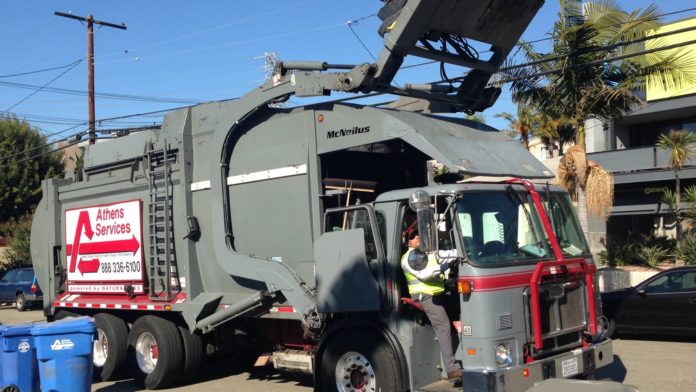Long Beach looks set to follow a recent move by the city of Los Angeles to establish franchise monopolies on commercial waste hauling – a system that already is facing a legal challenge.
The Long Beach City Council voted last month to send notices to the roughly 10 waste haulers serving the city’s large multifamily and commercial properties that it intends to convert to an exclusive waste-hauling franchise system similar to L.A.’s within five years.
The vote came despite opposition from the local business community and waste-hauling industry, which said exclusive franchise systems lead to higher trash collection costs and drive out small independent haulers.
“We share many of the same concerns of many of our small businesses and apartment owners over the potential costs increases that could be incurred,” Jeremy Harris, senior vice president with the Long Beach Area Chamber of Commerce, said in an email. “We know costs have gone up for apartment owners in Los Angeles where this has been implemented.”
The cost of trash pickups for commercial property owners and apartment landlords in Los Angeles are slated to go up as much as 130 percent – from a current range of $100 to $187 for weekly service of each standard 3-cubic-yard bin to $216 and upwards as high as $486. Those prices are expected to kick in as the city’s franchise system rolls out over the next year, based on city documents and a waste hauling contract for one of the franchisees, City of Industry-based Athens Services, obtained by the Business Journal. A combination of new state waste-hauling mandates and costs associated with covering huge geographical franchise zones were cited as reasons for the jumps.
That prompted an apartment building owner to file a lawsuit last week in Los Angeles Superior Court challenging the L.A. trash franchise system. The suit says that the fee increases violate California’s Proposition 218, which requires voter approval for tax hikes, and that the entire program needs to be approved by voters on a citywide ballot.
The exclusive franchises apply only to commercial and multifamily properties; single-family residences in both cities are expected to continue to be serviced by municipal workers; multifamily buildings in Long Beach with fewer than 10 units are also serviced by city workers.
The Los Angeles Alliance for a New Economy, a union-allied nonprofit, has spearheaded the moves toward exclusive franchise zones in Los Angeles and Long Beach, Los Angeles County’s second-largest city.
The alliance said its goal for these “zero-waste” programs is to boost recycling efforts and to reduce the frequency of garbage truck traffic that takes place when multiple haulers serve customers in the same neighborhoods.
Maurice Thomas, a Long Beach resident and member of Teamsters Union Local 396, said in a blog on LAANE’s website that he supports the franchise moves.
“One of the ways that Long Beach can expand opportunities for people looking for gainful employment is by increasing access to recycling in our city,” Thomas said. “Long Beach can create good green jobs for residents and become a green job development leader for other cities to follow.”
Some critics have said that one of the unstated goals of LAANE and its union allies is to create a system with just a few haulers with large workforces, which would make it easier to organize the workers into unions.
The waste-hauling industry also is concerned about the uncertainty the Long Beach council’s vote could bring for local haulers, since they won’t know for several years whether they will end up holding the exclusive franchises or be left out in the cold, Ron Saldana, executive director of California Waste & Recycling Association in Anaheim, said in an email.
“In the short run, it will freeze franchisee investment, since investors won’t know what their future return on their investments might be,” he said.

